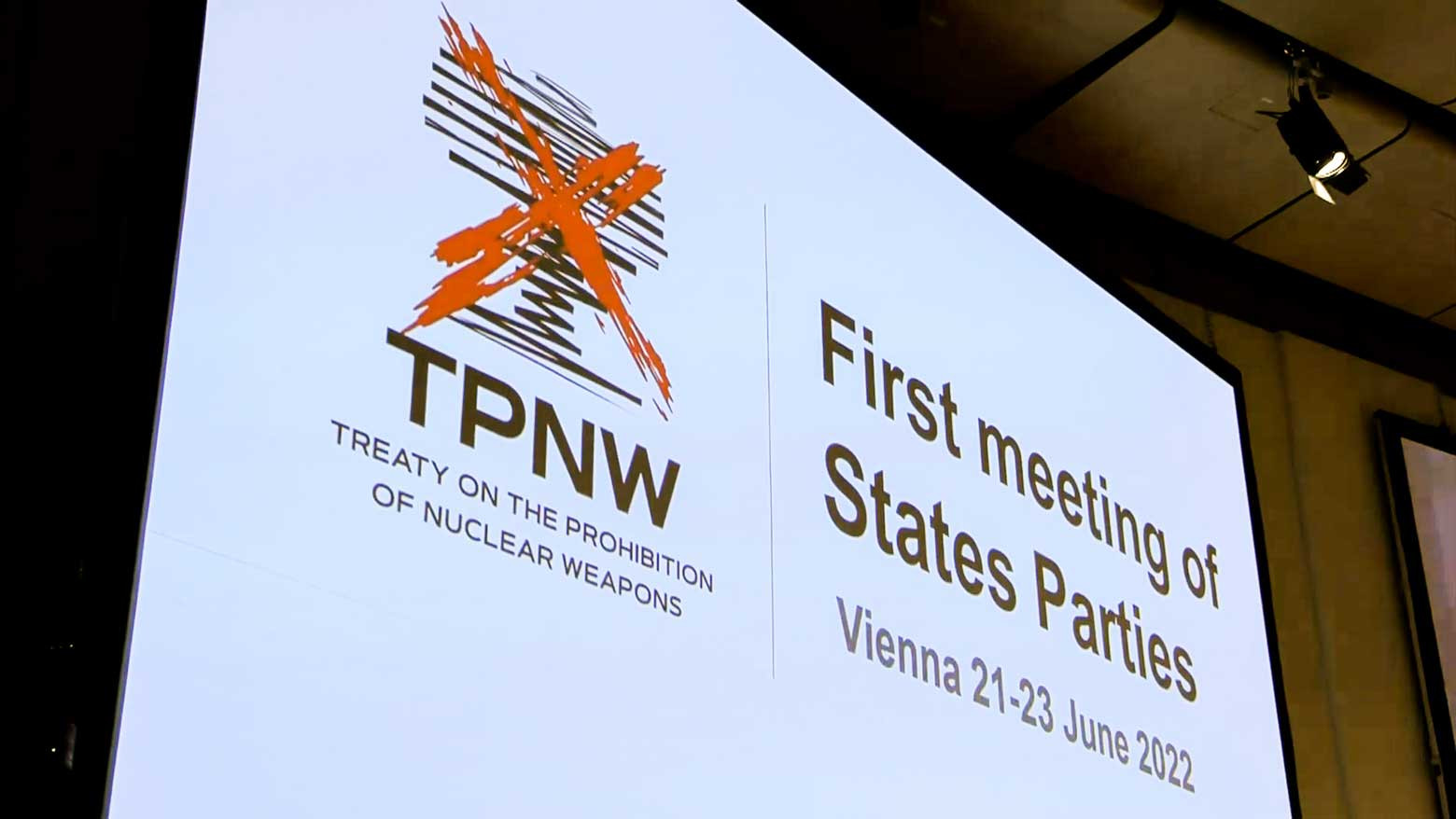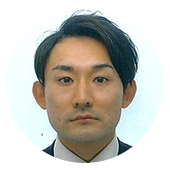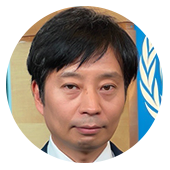The Treaty on the Prohibition of Nuclear Weapons entered into force in January last year. So far, it has been ratified by more than 60 states. But no countries that possess nuclear weapons or are protected by a nuclear umbrella, including Japan, are among them.
Meeting head conveys sense of crisis
Austrian diplomat Alexander Kmentt served as head of the meeting. He spoke to NHK ahead of the talks.
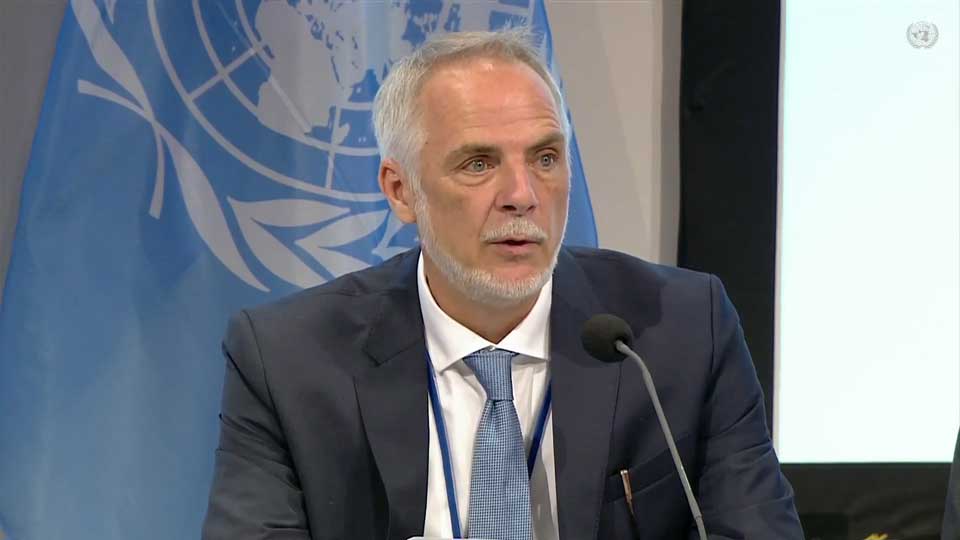
"I think it's exactly now the time to talk of nuclear disarmament. If you know that the humanitarian consequences of these weapons would be global and if you know the risks of having these weapons are extremely serious, then the idea that nuclear deterrence will hold is maybe just an illusion," he said.
Observers acknowledge dilemma
At the meeting, delegates from the states parties directed harsh criticism toward Russia for recently threatening to use nuclear weapons. They also expressed concern about the possibility of nuclear armaments increasing as more countries emphasize nuclear deterrence.
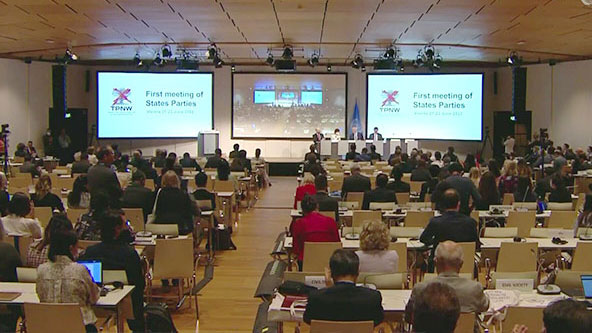
More than 30 countries that are not part of the treaty also took part as observers. The number was far higher than initially expected, with much attention on NATO members protected by the US nuclear umbrella, including Germany and the Netherlands.
Delegates from those two countries said they can't join the treaty because of NATO's nuclear deterrence policy. Still, they did say they want to share the goal of creating a nuclear-free world.
The observers also included Finland, which neighbors Russia and has recently applied for NATO membership due to the invasion of Ukraine.
"We think a nuclear-free world can only be achieved through negotiations, especially with countries who possess these weapons," Finnish Ambassador for Arms Control Jarmo Viinanen told NHK.
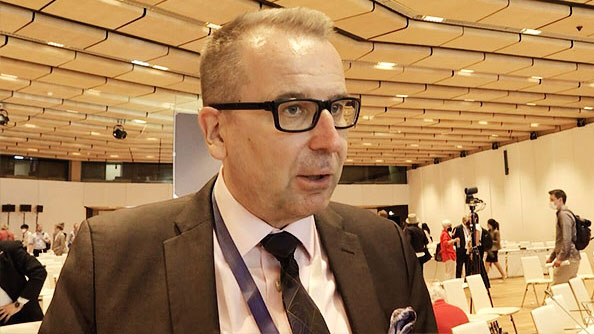
"They have to participate in the negotiations, and primary responsibility of course lies with the biggest nuclear possessors, the United States and Russia," he continued.
ICAN moves conversation forward
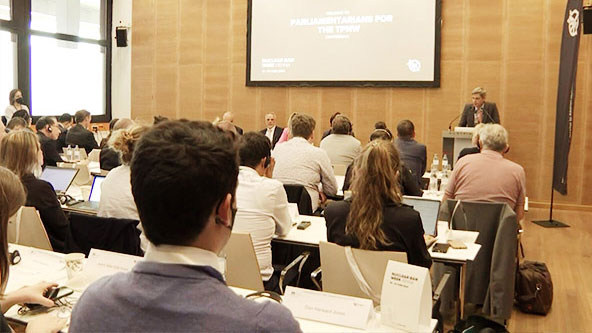
The Nobel Peace Prize-winning International Campaign to Abolish Nuclear Weapons (ICAN) was instrumental in getting the treaty off the ground. The group organized a session to discuss nuclear disarmament with parliamentarians on the sidelines of the main meeting.
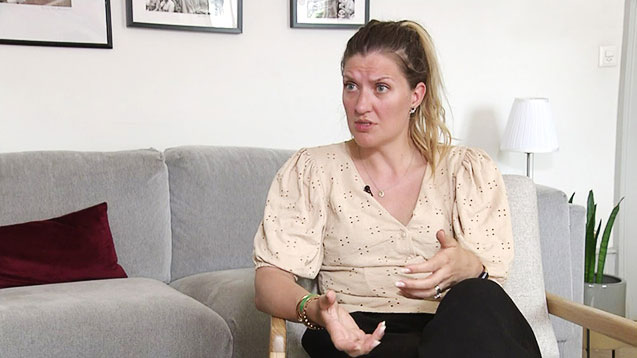
ICAN Executive Director Beatrice Fihn said she wanted everyone to ask themselves whether nuclear arms can really be justified under the name of deterrence: "The biggest challenge is to really take this outrage about nuclear threats, and this worry that people have about nuclear war, and channel it into political pressure."
Hibakusha stand tall
Even though the Japanese government did not take part in the meeting of states parties to the treaty, atomic bomb survivors from Hiroshima and Nagasaki were present. Known as hibakusha, they are recognized in the treaty's preamble.
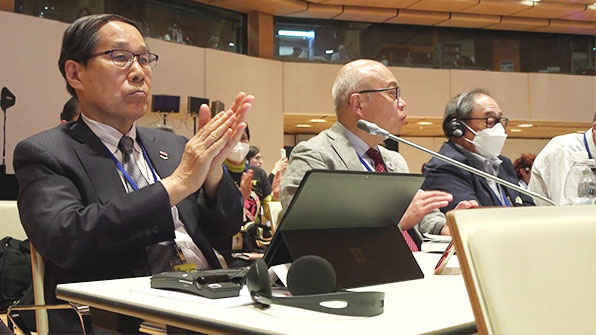
Tomonaga Masao, 79, is one of them. The day the atomic bomb fell on Nagasaki, he was at home 2.5 kilometers from ground zero. He was two years old at the time. He did not suffer from severe injuries but his house was badly damaged.
In Vienna, he spoke about the hibakusha's hopes for the treaty, and their concerns about the fact that many countries still depend on nuclear deterrence. He received a standing ovation.
"I'm very happy that the treaty entered into force, as survivors are aging. But it's regrettable that nine nuclear powers and more than 30 countries still depend on the nuclear umbrella, and that Japan, the only country that has ever come under atomic bomb attacks, is under the US nuclear umbrella," he said.
After his speech, Tomonaga said he hoped the treaty would win greater understanding among many more countries.
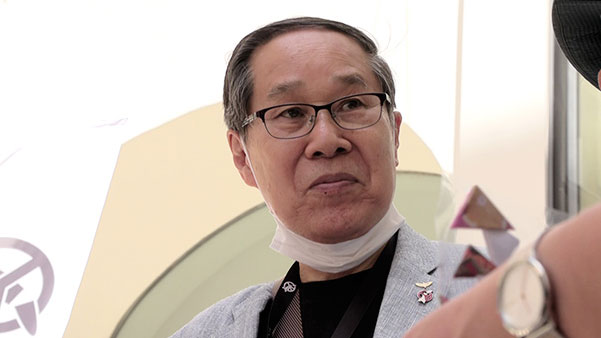
"Although nuclear powers and Japan did not attend the meeting, I think it has gotten off to a good start as quite a number of countries took part as observers. I think the first meeting of states parties to the treaty was successful."
Japanese student speaks up
As the surviving hibakusha grow older, a new generation of Japanese people are stepping up to ensure their voices will always be heard.
University student Takahashi Yuta made an impactful speech at the ICAN session, drawing on his acquaintance with an atomic bomb victim in Hiroshima who died last year.
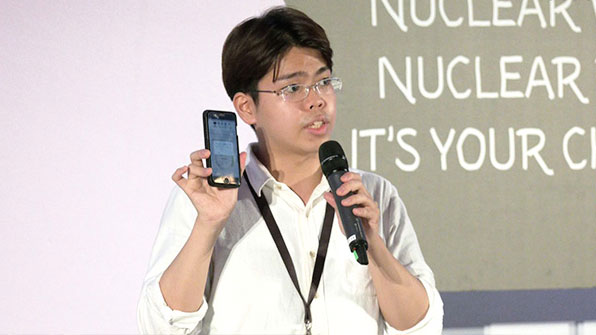
"It's our last chance to directly hear from atomic bomb survivors about what they've gone through. If we don't pass on their stories now, we can't ensure their message is heard in the future," he said.
As a schoolboy, Takahashi interviewed hibakusha and collected signatures for a petition demanding nuclear abolition.
He said it was odd that the Japanese government did not send a delegation to the meeting of states parties to the treaty.
But during another conference in Vienna on the humanitarian impact of nuclear weapons that was held ahead of the treaty meeting, Takahashi had a chance to put forward his concerns.
"I have collected signatures calling on Japan to attend the states parties' meeting as an observer," he told a Japanese foreign ministry official. "I received 21,065 signatures in three days. What do you think about that?"
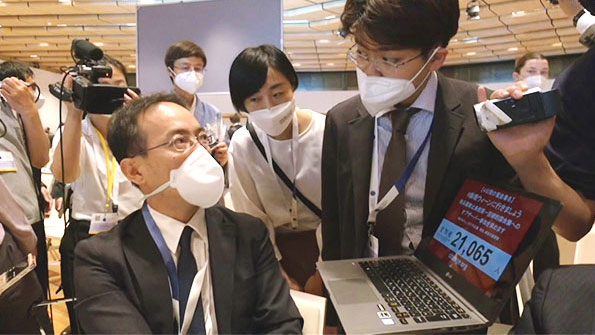
The official responded that nuclear weapons "can't be reduced without the cooperation of nuclear powers. Efforts should be made to encourage those countries to get involved in disarmament," he said.
Meeting bears some fruit
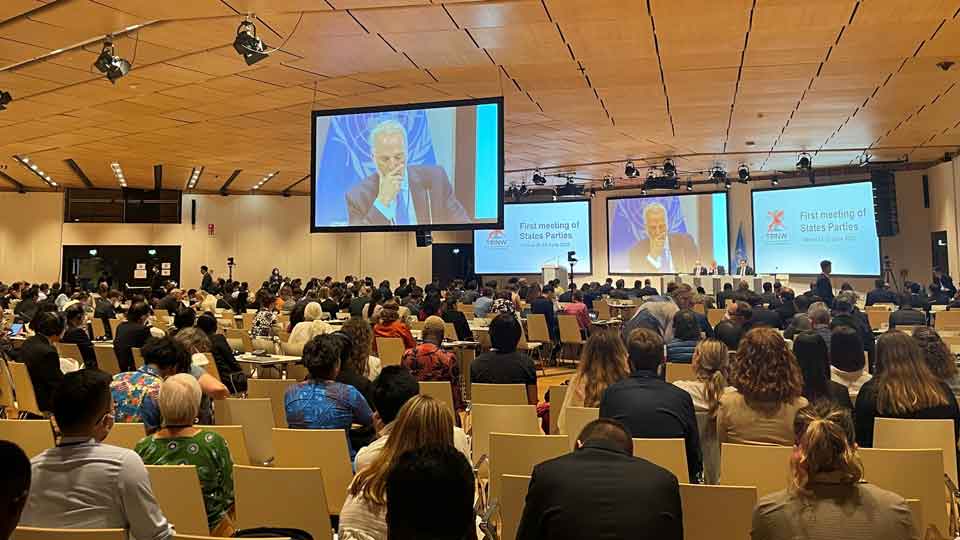
And although the treaty's ultimate goal is still a long way off, the main meeting did bear some fruit. On the final day, Kmentt presented two documents.
The first was the Vienna Declaration. It urges the global community to realize a nuclear-free world and calls for more efforts to get other countries on board.
The second was the Vienna Action Plan. It calls for dialogue with nuclear powers, and detailed measures to support those harmed by the use and testing of nuclear weapons.
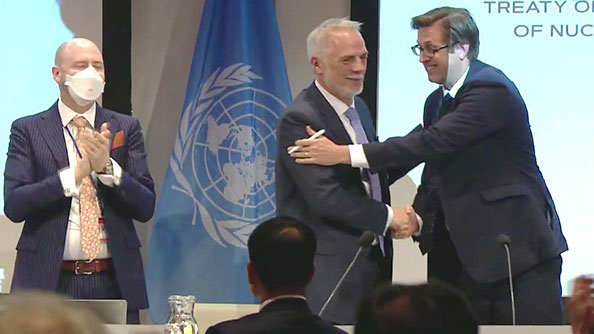
At the closing day press conference, Kmentt was optimistic. He pointed to the fact that there were more attendees than expected.
"We have demonstrated that we are basing our arguments on very profound sets of evidence, for the humanitarian consequences and risks," he said. "And I think it is now time for those who have been skeptical to recognize this and engage constructively with the profound issues that we raise."
All eyes on next UN conference
The discussion on nuclear weapons will next take to the global stage at the United Nations in New York on August 1. The conference to review the Nuclear Nonproliferation Treaty, or NPT, sets the course for the global drive toward disarmament.
Nuclear powers will be taking part. The NPT obliges them to engage in disarmament.
The previous review conference seven years ago ended without the adoption of any agreements, but the stakes now are considerably higher.
Not only has Russia made a nuclear threat over Ukraine, but the United States is emphasizing the effect of nuclear deterrence. North Korea is headed to another nuclear test and China is building up its nuclear arsenal. A lack of progress at the conference could trigger an increase in nuclear proliferation.
Nakamitsu Izumi, the UN Under-Secretary-General and High Representative for
Disarmament Affairs, says the NPT and the TPNW discussed in Vienna should complement each other to achieve realistic disarmament.
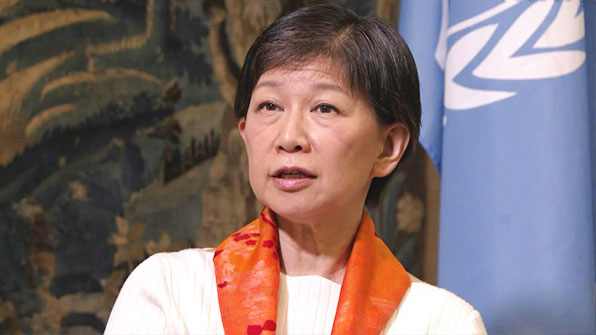
"If the upcoming NPT review conference ends up only highlighting discord among countries involved, people would think it's indeed difficult to promote nuclear disarmament within the NPT framework. That must be avoided," she said.
Nakamitsu is vowing to do all she can to find common ground. And she believes it is time to strike while the iron's hot: "History tells us that after a huge crisis, an opportunity always emerges for creating a new security framework or international agreement."
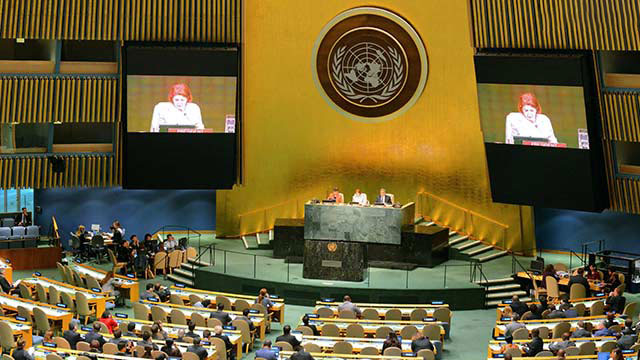
As for Japan, the NPT conference coincides with the 77th anniversaries of the atomic bombings of Hiroshima and Nagasaki. The only country to have witnessed the horrors of nuclear war first-hand is increasingly urged to consider what role it can play in the push for disarmament.
